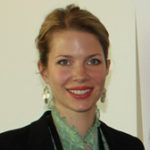

2012 Young Scholars: Johanna Christensen

University of Melbourne
I was left with a feeling of ‘so what can we do? What does this mean to the people producing the food?’.
The main part of my doctoral research aims to understand the history of apple growing in Victoria and to uncover the relationships between biodiversity, place and climate change. I focus very much on the interplay between the ecological and the socio-cultural aspects of apple growing and argue that one cannot be considered without the other.
The conference was useful to me in a sense that I realised the general importance that is placed on the physical aspects of food production, while the research arena I come from has a big emphasize on the social and cultural contexts. The conference exposed me to the so called ‘hard sciences’ and economic aspects which on the one hand was very interesting, on the other hand however, I searched for the links to the actual people. I was left with a feeling of ‘so what can we do? What does this mean to the people producing the food?’. In one way this is the task of us new scholars, but considering issues surrounding food security have been around for many decades, there still didn’t seem to be clarity for the future, except for a call to intensify agriculture practices and ever increase yields and productivity, which so far has not been able to feed the world.
I was waiting for a definition of food security and what it actually means. To me food security means something completely different in China, compared to Australia, compared to Europe. Yet, this was not really addressed. Considering there were many participants from so called developing countries, I was hoping for some mention of food sovereignty which of course can be very different to security but perhaps more relevant in regards to less industrialised countries.
While I am left somewhat critical of the overall content and vibe of the conference presentations, I was very excited to be able to speak to fellow scholars and exchange ideas and research foci. While everyone had a different background we all seemed to share the basic aim for a more food secure future. I enjoyed the group session on the last day, where all scholars spoke about their research background and also shared some feedback about the conference.
Although I was left wanting more, I really enjoyed the conference and found the information very useful. I particularly enjoyed Dr Christine Padoch’s presentation on ‘More than just trees’, which probably echoed the most with me. I was extremely impressed with the organisation of the conference, the logistics and the especially generous funding given to the scholars. Thank you Crawford Fund for enabling me to attend and I look forward to staying in touch, especially with the other scholars.
I want to finish with a quote from Virginia Nazarea: “Local knowledge and cultural memory are crucial for the conservation of biodiversity because both serve as repositories of alternative choices that keep cultural and biological diversity flourishing.” (Nazarea, 2006, p.318).
NAZAREA, V. D. 2006. Local Knowledge and Memory in Biodiversity Conservation. Annual Review of Anthropology, 35, 317–35